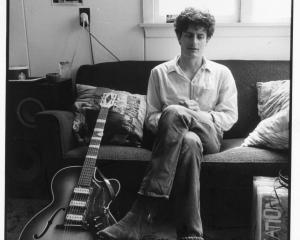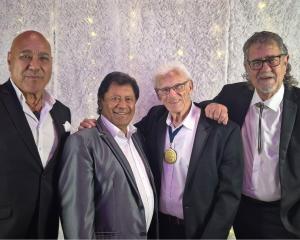Vouching for the veracity and passion of his work, he seemingly aimed to lower expectations, writing, "In the end, it's just an album".
That may be the most ridiculous statement Rose has made in 17 years of whoppers.
Just an album! Sure, and Citizen Kane was just a movie.
And Brando as Don Corleone was just a mid-career acting gig.
Everyone with a passing interest in rock knows the abbreviated history of Chinese Democracy.
Recording for the album, the follow-up to Guns N' Roses' mammoth, chart-topping Use Your Illusion project, began in the early 1990s.
Soon, though, Rose's authoritarian grip squeezed the life out of the original line-up, including his lead guitarist and artistic foil, Slash, and it went splat.
Out of that goo rose the post-Guns band Velvet Revolver on one side and Axl, increasingly alone, on the other.
For the next decade and a-half, Rose continued to work, running through band members like speed dates.
This amorphous Guns N' Roses toured with varying degrees of success and spent time recording in 14 different studios in Los Angeles, Las Vegas, London and New York.
Meanwhile, Rose got older (he's 46 now), decided he looked good in cornrows, and spent about $US13 million ($NZ23.5 million) on a project few thought he would complete.
And now it is here.
Half the songs classify loosely as ballads, while the others are more forcefully up-tempo, but nearly every one makes unexpected stylistic switches.
The effect is theatrical, with voicings and arrangements often taking precedence over riffs and grooves, making Chinese Democracy more like the score to a rock opera than an arena-oriented assault.
It is not exactly an accessible album, though many hooks and bombastic rock moments surface within its layers.
Contrary to early reports, Rose didn't plunge into the "nu metal-style" industrial rock that he'd embraced a decade ago with the lone track Oh My God.
Had he done so, producing an album's worth of static-laden ravers, like the album's first single and title track, he might have embraced middle age as a respectable experimental rocker.
Conversely, had he fulfilled the dreams of the rabble who can't get past Appetite for Destruction, reconnecting with Slash at the old intersection of punk and metal, he would have roared back as the king of the charts without making much artistic progress.
Instead, making this album has transformed Rose from a hungry contrarian to a full-blown desert prophet, howling mightily in protest against a pop industry that encourages its stars to innovate only within the realm of what sells best.
At the same time, he has resisted the nostalgia that would have sent him after a purer time or sound, preferring to invest in a foggy future.
Convolution is everything as he spirals toward a total sound even he can't quite apprehend.
Chinese Democracy is an album that turns in upon itself instead of reaching out to instantly become a ring tone.
Nothing on it immediately reveals its essence.
Even the songs with hooks, such as the sing-song rant Better and the grande olde ballad Street of Dreams, derail themselves in subtle ways, requiring the listener to reconsider their first judgement.
This will frustrate plenty of listeners; lovers of "edgy" music may find it too melodic and rooted in the blues, while fans seeking simple catharsis may rue the many shifts in tone and tempo.
The end result is a cyborgian blend of pop expressiveness, traditional rock bravado and Brian Wilson-style beautiful weirdness.
The snake-dance-inspiring rhythms that bring Rose's libido to life occasionally dominate, as do the romantic piano runs that represent his heart.
Neither overcomes the other, and sometimes both collide in the same song.
- Ann Powers












